cjdrmYyk fo'ofo|ky;] Hkksiky cjdrmYyk fo'ofo|ky - Barkatullah ...
cjdrmYyk fo'ofo|ky;] Hkksiky cjdrmYyk fo'ofo|ky - Barkatullah ...
cjdrmYyk fo'ofo|ky;] Hkksiky cjdrmYyk fo'ofo|ky - Barkatullah ...
Create successful ePaper yourself
Turn your PDF publications into a flip-book with our unique Google optimized e-Paper software.
LL.M. Part – I – Semester- IIMax. Mark: 100 Min. Marks: 40GROUP – B CRIMINAL LAWDRUG ADDICTION, CRIMINAL JUSTICE AND HUMAN RIGHTSObjective of the CourseAlmost all the major dilemmas of criminal policy surface rather acutely incombating drug addiction and trafficking through the legal order. The issue ofinteraction between drug abuse and criminality is quite complex. At least threeimportant questions have been recently identified as crucial for comparativeresearch. First to what extent drug dependence contributes to criminal behaviour?Apart from these causal issues, there are the broad questions of the social costsbenefitsof criminalization of addictive behaviour. Should drug taking remain inthe category of of "crime without victism?" or should it be viewed as posting anever- growing threat to human resource development and be subjected to statecontrol, over individual choices as to survival and life- styles?The problems here are not merely ideological or theoretical. User of drugs forpersonal, non-therapeutic purpose may will be linked with internationaltrafficking in psychotropic substances. It has even been suggested thatencouragement of drug- dependency may have, in addition to motivation of highprofiles, politically subversive aspects.Assuming that both addiction and trafficking have to be regulated, what penalpolices should be appropriate? What human rights costs in the administration ofcriminal justice should be considered acceptable? The international response tothese questions is indicated by the Single convention on narcotic drugs, 1961,adopted in New York, 30 March 1961 and as amended by 1972 protocol inGeneva, 25 March, 1972 and the convention on psychotropic substances, adoptedin Vienna, 21 February 1971, India has recently adopted the basic principles ofthese conventions in the narcotic drugs and psychotropic substances Act, 1986Broadly, penal policy dilemmas here relate to: (a) management of sanctionsrelating to production, distribution and illicit commerce in narcotic substancesand, (b) ways of prevention of abuse of drugs, including speedy diagnosis,treatment, correction, aftercare, rehabilitation, and realization of persons affected.Important problems of method in studying in the impact of regulation needevaluated at every stages.11


![cjdrmYyk fo'ofo|ky;] Hkksiky cjdrmYyk fo'ofo|ky - Barkatullah ...](https://img.yumpu.com/50831007/11/500x640/cjdrmyyk-foofo-ky-hkksiky-cjdrmyyk-foofo-ky-barkatullah-.jpg)
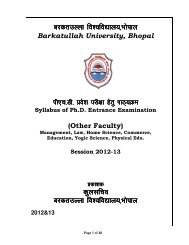
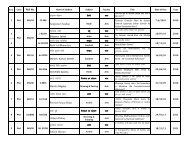
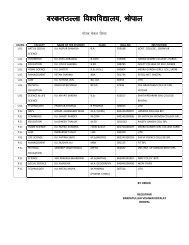

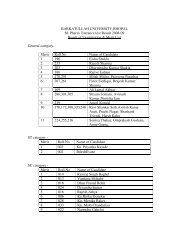
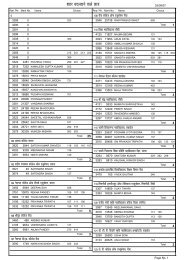


![cjdrmYyk fo'ofo|ky;] Hkksiky cjdrmYyk fo'ofo|ky;] Hkksiky - Barkatullah ...](https://img.yumpu.com/46923562/1/190x245/cjdrmyyk-foofo-ky-hkksiky-cjdrmyyk-foofo-ky-hkksiky-barkatullah-.jpg?quality=85)




